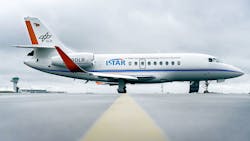Aero-Dienst Wins Long-Term Contract for the German Aerospace Center’s ISTAR Research Aircraft
Nuremberg, August 10 2021 (sr): The Nuremberg full-service provider for business aviation and air ambulance services has won its bid for a four-year contract with the German Aerospace Center (the Deutsches Zentrum für Luft- und Raumfahrt, orDLR) to maintain the Falcon 2000LX EASy ISTAR (In-flight Systems & Technology Airborne Research) aircraft.
The contract covers all work to be done on the Falcon 2000LX that is not covered by DLR’s own maintenance organisation. The scope ranges from base maintenance such as 12M/24M/36M inspections to special inspections of engines or structural parts that are required in connection with internally or externally commissioned research projects involving the ISTAR.
“We are extremely pleased to have been able to conclude this four-year contract with the German Aerospace Center,” remarks Florian Heinzelmann, Dassault Maintenance Manager at Aero-Dienst; he adds: “The confidence placed in us is the result of our quality work, as well as the performance and enthusiasm of our Falcon team. This definitely underscores our capabilities on the global stage.”
With the conclusion of the initial conversion phase at Dassault according to the DLR’s specifications 18 months ago, ISTAR has become the newest member of the DLR fleet, which features a total of 12 aircraft (including helicopters). When fully equipped, ISTAR will be capable of testing the flight characteristics of new aircraft designs under real-life operating conditions either directly or virtually, and either manned or unmanned. The aircraft is used to ascertain data for optimized aerodynamics, flight guidance and flight control. It also opens up the way to another major step towards digital transformation in aviation: The DLR will create the first ever digital twin for ISTAR that will accompany it for its entire service life.
“This research aircraft plays an essential role in the development of new, environmentally friendly and efficient aircraft, engines and assistance systems, because the technology needed for climate-neutral aviation will be pushed ahead with the aid of ISTAR,” explains Martin Gestwa, Head of the Research Flight department and Technical Operations at the DLR. “In view of extensive modifications to DLR research aircraft, maintenance and repair procedures differ significantly from those used for unmodified aircraft. So, we are very grateful to have found an extremely competent partner for our ISTAR research aircraft in Aero-Dienst.”
Major maintenance work, such as the annual inspections, will be carried out by the Aero-Dienst team directly at the ISTAR base in Braunschweig. This allows the DLR specialists to make efficient use of the research aircraft’s downtime for instrument installations and modifications as part of upcoming research projects.
For its Falcon team, Aero-Dienst employs around 30 technicians with decades of experience and expertise in the maintenance of business jets from the Falcon series. Depending on the scope and type of work involved, specialists from the airframe, avionics or engine divisions will be assigned to the ISTAR.
“We’re proud to be indirectly involved in aviation research projects that are so important for aerodynamics, aeroelasticity, structural engineering and propulsion,” says Aero-Dienst’s Managing Director, Viktor Peters; he affirms: “We will also be using the know-how, expertise and experience of our teams to provide the DLR with our utmost in flexible support in relevant areas for future research projects, such as experimental aircraft flight control and in-flight simulation.”
In addition to its headquarters in Nuremberg, Aero-Dienst also operates a maintenance station in Oberpfaffenhofen and has been successfully operating two stations in Austria—at the airports in Vienna and Klagenfurt—for many years. Its component shop in Landsberg am Lech allows Aero-Dienst to provide fast and local repairs for maintenance operators in Europe, the Middle East and Africa.




